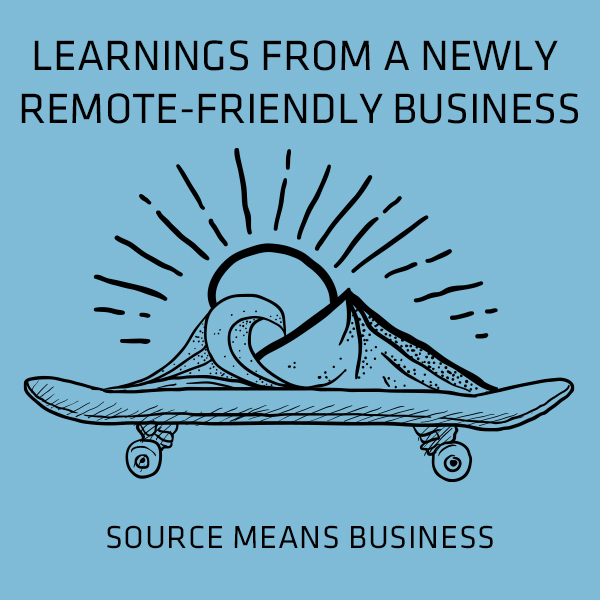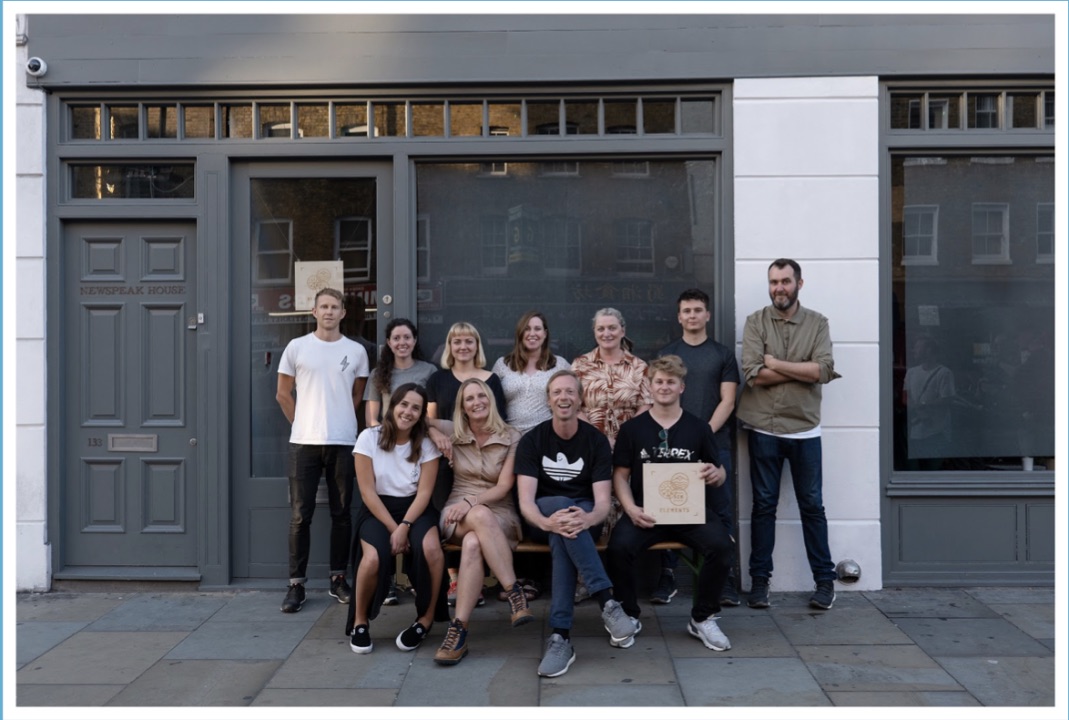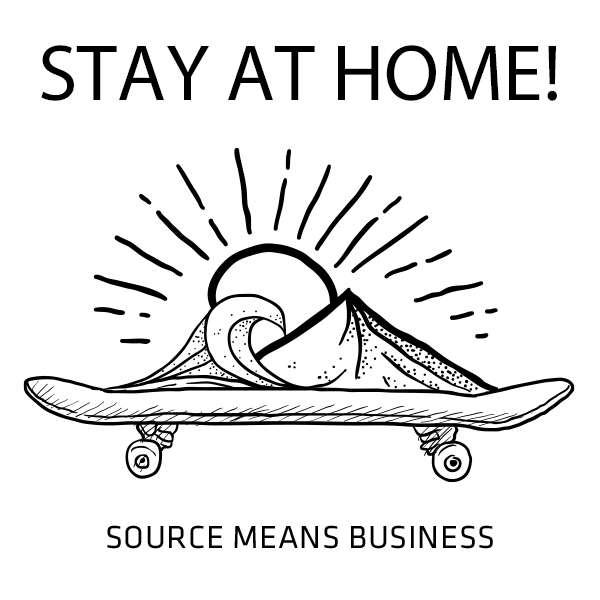
10 Learnings From A Newly Remote-Friendly Action Sports Business

Action sports creative comms agency All Conditions Media recently made the transition to becoming a remote-friendly business and share some invaluable insight as the globe shuts down and shifts to the homeworking model.
The UK-based company adapted their model in order to give their staff a better quality of life, attract the best people (no matter their location) and to freshen things up. After a successful two-month pilot scheme ACM rolled remote working out across their whole team, just as the majority of industries across the world begin tackling working from home.
Thanks to the team at ACM for sharing.
Ten Remote Working Tips For Companies, or What We Learned From Making All Conditions Media A Remote-Friendly Business

Team ACM & friends
Introduction
When we made the decision to make All Conditions Media a remote-friendly company, we were driven by three things:
1. A better quality of life for our staff.
2. The chance to attract the best people – no matter where they’re based.
3. A desire to change things up in what can be a pretty staid industry.
Then Covid-19 came along. Now, suddenly, everybody in our industry is having to deal with the reality of remote working.
With that in mind, we thought it’d be helpful to list the 10 things we learned as a company while going remote, in the hope that they will help you adapt to this change as quickly as possible.
1. Define how it will work.
When we told our staff we were all going to be working remotely from now on, they had one question.
‘How’s that going to work?’
Good question and one you MUST answer so everybody knows what is expected of them.
At ACM, we ask our team to be available between 10 and 2 GMT. Apart from that, they are free to schedule their work how they see fit – providing they deliver the same standard of work.
We tested this plan by running a two-month pilot scheme with a small team. When we were happy it worked, we rolled it out to the wider team.
We also hold regular feedback sessions with our team so they can feed back and let us know how it is working for them.
2. Adapt to your specific circumstances
A big part of our decision to become a remote-friendly business was to get rid of a lot of the trappings we felt were totally unnecessary in a 21st century agency, like an expensive showroom that doesn’t add any value to the work we do for clients.
But we were also careful not to go too far. For example, we opted to take an office in Platf9rm, a local co-working centre in Brighton. It means we can still handle the product we need (for seeding to media and influencers) and are still able to feel part of the wider Brighton business community.
It means that once things return to normal, our staff will have options – work from home or a location of their choice, or come into Platf9rm if they need to get some human contact.
3. Trust your staff
If you want to make a success of remote working, you must absolutely trust your staff.
For us, improving staff welfare was at the heart of our move to remote working, so trusting them was an implicit part of the whole plan. It’s no less important if this whole situation has been forced upon you by Covid-19.
Trusting your staff just means believing that they will do the work you pay them to do and not ‘take advantage’ of the new setup.
So don’t overwhelm them with onerous checks and balances. Don’t get caught up in worrying whether they will work less or take the piss.
Our experience has shown us that our staff are happier, more effective and more loyal to the company than ever before.
4. Have systems everybody follows
Every company has the systems geek with a vision of the whole thing seamlessly working together. It rarely happens, obviously.
But good systems are essential if you want to get around the obvious issues caused by people being unable to turn around and ask a simple question.
Firstly, you need to make sure your infrastructure is up to speed, and everybody understands it. How to access information quickly. Where things get filed.
Then, you need to work out what systems you’ll use to communicate with each other – and when.
We use Workflow Max for project and time tracking, Zoom for online-meetings (screens on obviously), Basecamp for inter-team comms, Dropbox for assets and Google Drive for documents.
Make sure everybody gets the process – and follows it.
5. Protect your culture
Probably the biggest fear when you decide to go remote. If you’re not in one place, do you even have a culture? To try and safeguard this, we implemented a simple step – everybody has to check in with the whole team at 11am, without exception.
These daily 11am catch up calls are where we talk rubbish and remind ourselves that it isn’t all work. And, currently, share Covid-19 memes.
It isn’t a work meeting. There’s no agenda. We log onto our shared space and have a conversation about – well, anything except work.
By making this obligatory, everybody has an equal chance to contribute to the culture, and safeguard the thing that attracted them to the company in the first place.

Source Illustration
6. Meet regularly
Obviously, it’s going to be a while until we can do this again. That first post-Corona get-together is going to be our sweetest yet.
So assuming the world does get back to normal again, every month we’ll continue to adjourn to one location and spend the day working, catching up and hanging out. Until this lockdown, we had big plans to take them further afield, but that’ll have to wait until things get back to normal.
By paying for our team to get together in this way, and making it a regular date, it provides valued social connection and reconnects the team to the company vision.
We didn’t reinvent the wheel with this one. Time and again, remote work pioneers like Komoot, Basecamp and even our clients and friends at Much Better Adventures have advocated the importance and necessity of regular team get-togethers. They’re right.
7. Have rewards
We’ve been working hard to define and celebrate our Beliefs and Behaviours at ACM for a while now. It sounds cheesy, but it helps us understand what we expect from each other and the standards we aspire to at work and play.
Since going remote, it’s become even more important. That’s why we hold monthly awards that allows the team to celebrate the successes of their peers, and encourage everybody to explain why they nominated their chosen candidate.
It means we actively have to engage with our shared beliefs and behavioural standards, strengthening the concept as we go.
8. Consider your communications
Quick-fire comms channels like Slack and Basecamp can make for hastily written messages that are very open to misinterpretation. Without that face-to-face explanation, tone can easily be misconstrued and misunderstandings can arise quickly.
To alleviate this, we aimed for a new tone of voice that is much more positively-framed and collaborative, and helps keep inter-company comms running smoothly. We’re also clear about what we talk about, and where.
9. Encourage your team to switch off
Anybody who has worked from home knows how quickly the boundaries between work and home become blurred.
Without guidance, it’s easy for your team to fall into this trap – upsetting the work/life balance that was the entire point in the first place.
Make sure you encourage your team to be aware of and in control of those boundaries as quickly as you can.
This one’s more important now than ever before.
10. ‘Office’ set-up
You might not be able to physically see your team slumped in their chairs but you still need to look after their wellbeing.
Computers, chairs and lighting still all need to meet office/HR standards.
So be proactive about your team’s working health, and help them create an individual set-up that will follow through on the whole ‘quality of life’ premise.
Conclusion
It already feels like a lifetime ago. But becoming a remote-friendly company transformed the health and closeness of our company. It also saw our productivity and our client work reach new heights.
The idea of turning the Covid-19 situation into an opportunity is already a complete cliché – after only one week. We’re all getting used to this new reality.
Hopefully these thoughts will help other companies who are now having to deal with remote working adapt as quickly as possible.




